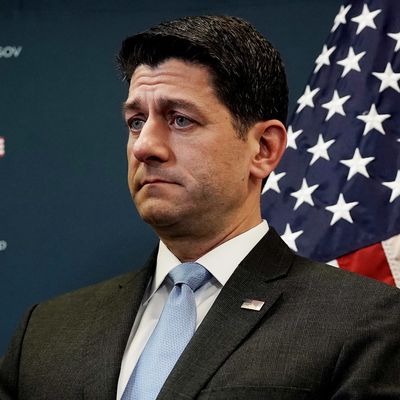
Paul Ryan’s legacy in his relatively brief period in the national limelight (basically beginning with his emergence as the chief fiscal spokesman for Republicans after Barack Obama’s election in 2008) is multifaceted. As New York’s Jonathan Chait points out, he was the eternal representative of a highly hypocritical brand of fiscal politics that enabled budget deficits in Republican administrations and demonized them under Democrats, to the strange delight of media elites. He was also an ambivalent figure in the Republican Establishment’s relationship with the conservative movement, serving an intermediary function as Mitt Romney’s running mate in 2012 and as House Speaker since 2015. And you could make the argument that he (with a lot of accomplices) led the GOP’s surrender to Donald Trump after the 2016 elections.
But in the long run, Ryan may be remembered as a Republican politician with the ambition and (it seemed, for a moment) the means to undertake a mission that had thrived in the conservative dreamscape since the days of Barry Goldwater: the unraveling of the New Deal/Great Society safety net, also known as “the welfare state.” Unless he and his destructive agenda make a major comeback, he will have to be adjudged a failure in that endeavor.
It’s true that Ryan’s most concrete contributions to the anti-welfare-state cause — all those annual “Ryan Budgets” that Republicans approved during the Obama presidency — were mostly symbolic measures sure to be vetoed by a Democratic chief executive. But they served to solidify Republican interest in Ryan’s twin goals of “entitlement reform” (fundamental overhauls of Medicare —converting it to subsidies for private health insurance — and Medicaid — making it a block grant to the states) and anti-poverty “strategies” that included killing off most existing public-sector programs.
Then, in October of 2016, apparently annoyed that media types were yawning at his agenda, Ryan offered a glimpse of what Republicans might do if they managed to pull off a “trifecta” and gain control of both the Executive and Legislative branches.
“This is our plan for 2017,” Ryan said, waving a copy of his “Better Way” policy agenda. “Much of this you can do through budget reconciliation.” He explained that key pieces are “fiscal in nature,” meaning they can be moved quickly through a budget maneuver that requires a simple majority in the Senate and House. “This is our game plan for 2017,” Ryan said again to the seemingly unconvinced press.
He even called the reconciliation process a “bazooka in my pocket.” And for a while there it seemed very likely that it would be the vehicle for a health-care-focused budget bill that would block-grant the old Medicaid entitlement while repealing the new Obamacare entitlement, thus giving Ryan and Republicans a historic victory.
But as we now know, the “bazooka” wasn’t powerful enough to blast the bill through the Republican-controlled Senate, and complicated matters on many occasions by subjecting the legislation to all sorts of arcane parliamentary rules that limited its scope. And so both Obamacare, and Medicaid-as-we-know-it, survived 2017.
Yes, Republicans did enact a tax cut that, for them, salvaged the year, and that had to be gratifying to the inveterate supply-sider Ryan. But when he talked about reviving his most important passion — “entitlement reform” or in its demagogic form, “welfare reform” — in 2018, he was brusquely shot down by Mitch McConnell and the White House.
So looking ahead to a straitened GOP margin in the House — if not a Democratic House — next year, and the prospect of having to wait until 2021 at the earliest to resume the fight against the welfare state (and that assumed the mixed blessing of a Trump reelection), Ryan decided to go home to Wisconsin and regroup. He’s only 48, and has plenty of time to gird his loins for another crusade against the New Deal and the Great Society.
But what Ryan’s setbacks should have taught him — as they earlier taught Ronald Reagan and George W. Bush — is that there is not and may never be a solid political foundation for a successful assault on popular programs like Social Security, Medicare and Medicaid, or even Obamacare, food stamps, and disability benefits. When push comes to shove, even Republican voters are squeamish about implementing their party’s rhetoric supporting the free market or the states as superior mechanisms for providing income security or health care. Crude, ignorant, and erratic as he is, Donald Trump seems to understand this basic reality. True believers in conservative ideology like Paul Ryan don’t, and thus tend to fail.






























